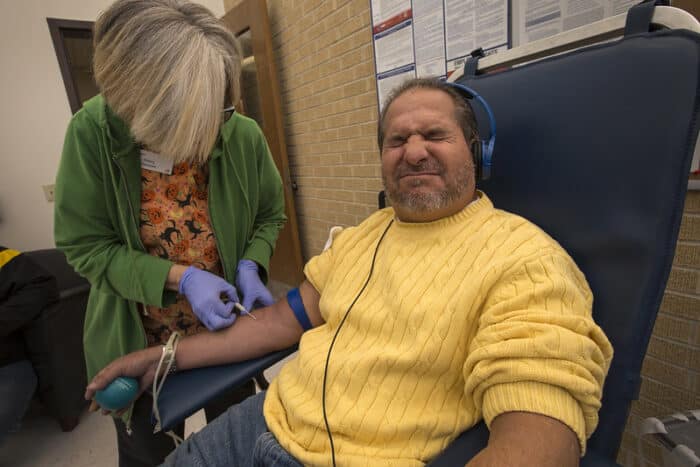Have you ever wanted to become a phlebotomist?
Or are you an aspiring phlebotomist, and want to know how long it takes to get a phlebotomy certification?
If you nodded yes to those questions, we’ve got you covered.
In this article, we will uncover the difference between a phlebotomy certificate and a certification, how long it takes to get a phlebotomy certification, and how long they last.
So, let’s dive right in!
What is the Difference Between a Phlebotomy Certificate and Certification?
Even though both the terms ‘certificate’ and ‘certification’ sound similar, there is a significant difference between the two.
We know how confusing both these terms may sound, and they are often even used interchangeably, but we’re here to make it simple for you.
So, what is a Phlebotomy Certificate?
Think of a Phlebotomy Certificate like a diploma you receive after finishing a phlebotomy training program. This program could be offered by a school or healthcare institute.
It shows that you’ve completed the necessary classes and hands-on training to learn how to draw blood properly. However, having this certificate doesn’t necessarily mean you’re certified to work as a phlebotomist just yet.
And what is a phlebotomy certification?
Now, Phlebotomy Certification is like getting a special badge that proves you’re really good at drawing blood. To earn this certification, you need to do more than just complete a training program.
You have to pass a standardized exam given by a recognized organization, like the National Healthcareer Association (NHA) or the American Society of Phlebotomy Technicians (ASPT).
This exam checks if you truly know your stuff when it comes to blood collection. Having a Phlebotomy Certification is often required or preferred by employers and regulators if you want to work as a phlebotomist.
See: Online Phlebotomist Classes

Do You Want To Become a Phlebotomist? Check Out Free Phlebotomist Masterclass!
In our masterclass you learn:
- How to be a Phlebotomist faster…in just 2 months!
- Avoid student debt & driving to classes
- #1 thing employers want from Phlebotomists
- How to stand-apart & get a university certificate for a strong resume
How Long Does it Take to Get Phlebotomy Certification?
Now that you know the difference between a phlebotomy certificate and a certification, you might be curious about how long it takes to get a phlebotomy certification.
The duration of starting your school to getting your phlebotomy certification depends on the type of phlebotomy training program you choose.
Let’s delve into that in detail.
Here is a guide on the steps you need to take to get your phlebotomy certification:
- Training Time: First, you need to complete your phlebotomy training. This can take a few weeks to a few months, depending on the program you choose. Some programs let you study while you work or go to school part-time, while others are full-time and finish faster.
- Get Hands-On Training: After you complete your training, you’ll need to practice drawing blood. This practical experience can take several weeks, depending on your program.
- Getting Ready for the Exam: Before you sit for the certification exam, you’ll want to prepare. This might involve reviewing what you’ve learned, taking practice tests, and making sure you’re confident in your skills. The preparation time can vary, but it’s usually a few days to a few weeks.
- Taking the Exam: The actual certification exam usually takes a few hours. You’ll need to schedule a specific date and time to do it.
- Getting Your Certification: Once you pass the exam, you’ll receive your Phlebotomy Certification. This usually happens within a few weeks. You’ll get a certificate or card that shows you’re officially certified.
So, from start to finish, getting your Phlebotomy Certification might take anywhere from a few months to a year or more, depending on your training program and how much time you spend preparing.
Also see: How to Become a Phlebotomist
How Long Does a Phlebotomy Certification Last?
There are two main certifications you can go for to become a certified phlebotomist. The two certifying organizations are the NHA and the ASCP.
Both these organizations offer certifications that vary in terms of syllabus and duration of expiration.
If you choose to get the NHA certification, this will last for two years, after which you will need to renew your certification.
On the other hand, if you choose to get the ASCP certification, it will last up to three years, after which you might need to renew your certification to continue being a certified phlebotomist.
Read: What is a Phlebotomist
Conclusion
Obtaining a Phlebotomy Certification is an achievable goal for those interested in pursuing a career in healthcare. The time it takes to get certified can vary, but with dedication and a clear plan, you can typically complete the necessary training and exams within a few months to a year.
Remember, the journey to certification may require hard work and commitment, but the reward of a fulfilling and valuable career in phlebotomy makes it all worthwhile.
If you are on the lookout for an ideal online phlebotomy training program, check out PREPPY’S program here>
Related Resources:
- Traveling Phlebotomist
- Phlebotomy Salary
- Phlebotomist Certification
- Phlebotomist Requirements
- Phlebotomist Skills
- Day in the Life of a Phlebotomist
- Ultimate Phlebotomist Resume Guide – Phlebotomy Job
- Phlebotomist Job Description
- Can A Phlebotomist Start IVs?
- Phlebotomist Duties
- What is the Difference Between a Licensed Phlebotomist and Certified Phlebotomist?
- Where Can a Phlebotomist Work?
- Phlebotomist Degree
- Pros and Cons of Being a Phlebotomist
- Mobile Phlebotomist
- How To Get a Phlebotomy Certification
- What are the Different Types of Phlebotomy Certifications?
- Top Places That Hire Phlebotomy Techs
- Phlebotomist Lab Technician
- Therapeutic Phlebotomy
- Phlebotomy Course
- Phlebotomist School
- EKG Phlebotomy Technician
- Order of Draw Phlebotomy
- Phlebotomy Internship
- 4-Week Phlebotomy Classes Online
Related Articles
-
How to Be Successful in College in 2022 – 7 Simple Tips to Succeed
-
How Do Scholarships Work? Read This First…Truth is Shocking
-
7 Best College Majors 2024: What Should I Major In?
-
How to Choose a College – 10 Things You Must Consider in 2024
-
Why Go to College? Top 13 Benefits for Adult Students in 2022
-
Top 5 Best Alternatives to Community College for 2024








